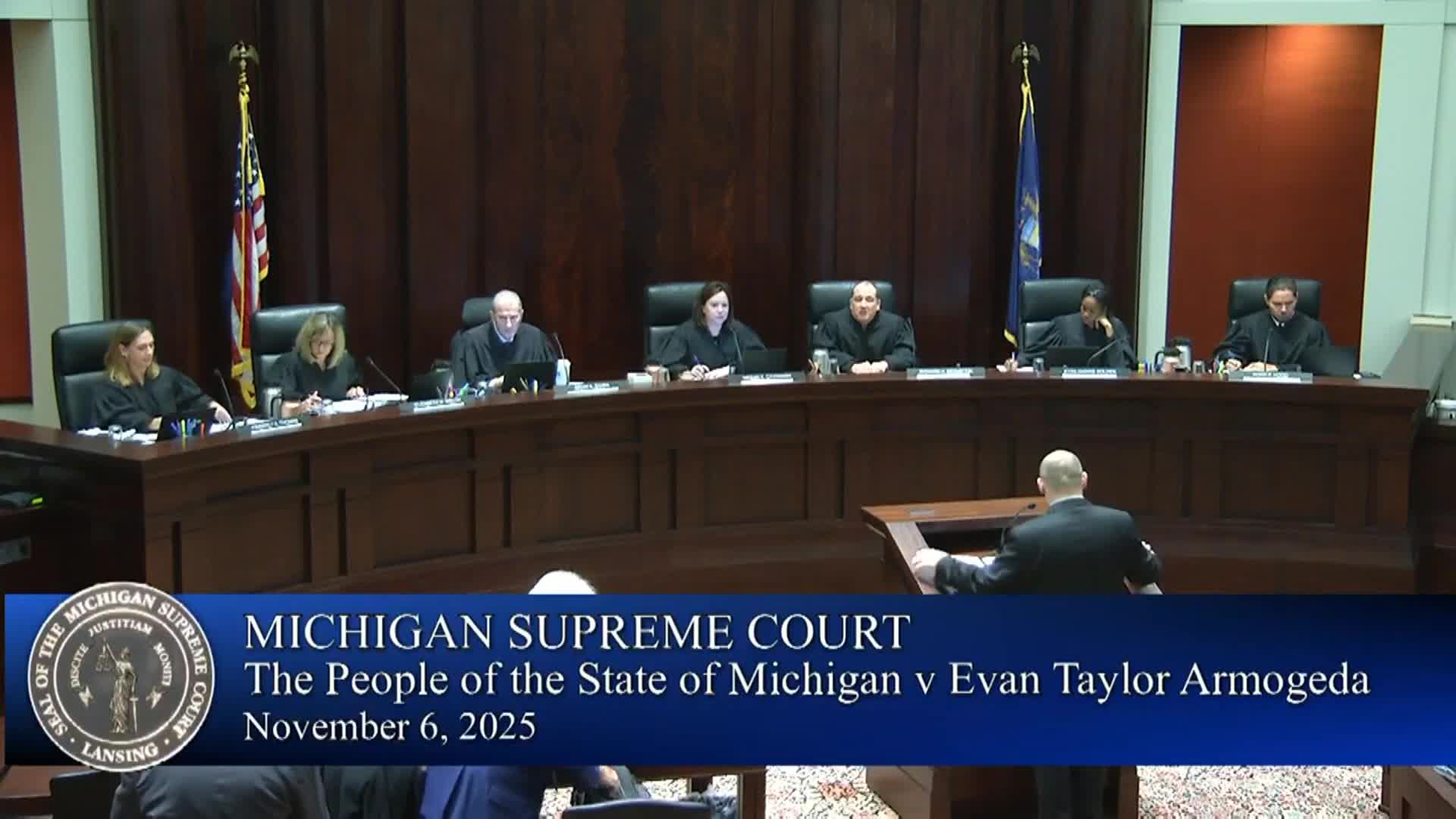Michigan Supreme Court hears challenge over resentencing when sentencing guidelines are miscalculated
Get AI-powered insights, summaries, and transcripts
Subscribe
Summary
At an oral argument before the Michigan Supreme Court, attorneys for Evan Armagueta asked the court to hold that resentencing is required whenever a trial court fails to calculate sentencing guidelines correctly, while the prosecutor urged deference when a judge says he would have imposed the same sentence regardless of the guideline calculation.
At an oral argument before the Michigan Supreme Court, attorneys for Evan Armagueta asked the court to hold that resentencing is required whenever a trial court fails to calculate sentencing guidelines correctly, while the prosecutor urged deference when a judge says he would have imposed the same sentence regardless of the guideline calculation.
"We ask this court to hold that resentencing is required anytime that the trial court did not properly calculate the guidelines prior to sentencing or resentencing," said Chris, counsel for Evan Armagueta, arguing that People v. Francisco and a decade of decisions require courts to calculate the guidelines, "consult and consider them as a highly relevant factor," and justify any out-of-guideline departures to permit meaningful appellate review.
Why it matters: The court’s decision could determine when sentencing errors force a new hearing and a new opportunity for allocution, or instead allow appellate courts to treat a judge’s statement that the sentence would be the same as a harmless error. That line affects defendants’ rights, the availability of appellate review, and how trial judges explain and record sentencing decisions.
Defense argument: Chris told the court the trial judge in Armagueta’s case "did not properly calculate the guidelines" and failed to articulate the extent of the departure. Defense counsel said a simple rearticulation by the sentencing judge would not remedy the lack of process because a defendant would lose the chance to allocute and the court would not be relying on the proper, contemporaneously calculated factual record. "A result should not be driven by the process," Chris said, urging the court to reaffirm Francisco and to order resentencing in this case.
Amicus brief and doctrinal frame: Jacqueline McCann, arguing on behalf of CDAM, framed the question more broadly as one of "actual prejudice" and long-standing Michigan practice. McCann said Michigan jurisprudence and court rules dating back decades treat sentences based on inaccurate information or misconceptions of the law as invalid and therefore subject to full resentencing. McCann argued that scoring errors and use of the wrong range qualify as inaccurate information requiring resentencing, and that where a judge refuses to reconsider a disclosed mistake, the proper remedy is a resentencing before a different judge.
Prosecutor’s position: Jerry Skrotenbore, Ingham County assistant prosecutor, urged the court not to adopt a bright-line rule requiring resentencing in every case of guideline error. He relied on federal analogues and state precedent, arguing that when the record shows a judge would have imposed the same sentence irrespective of the guideline range, the error can be harmless and need not trigger a new sentencing hearing. Skrotenbore cautioned that overruling established precedents would be a major doctrinal shift.
Questions from the court: Justices pressed both sides on practical consequences. One justice asked why, if the correct range is now known and parties agree the original calculation was wrong, the court would not simply remand for resentencing and allow the trial court to reaffirm the same sentence with a proper articulation. Defense and amicus responded that allowing post hoc rationalizations would undermine the process and defendants’ rights, while the prosecutor argued remanding for re-sentencing where the judge has already stated he would impose the same sentence would be wasteful and inconsistent with precedent.
Case posture and procedural notes: The parties stipulated a correct guidelines range after the Court of Appeals opinion; counsel disputed whether that stipulation changes the remedy. Counsel and amicus cited a range of Michigan authorities (including Francisco, Evans, Hicks, and challenges tied to pre- and post-Lockridge doctrine) and federal cases (including Booker, Molina-Martinez and a Sixth Circuit opinion) in support of their positions.
No final decision: After argument the court took the case under advisement and "the case will be submitted" for decision.
Looking ahead: A ruling could clarify the boundary between process-driven resentencing and harmless-error review when sentencing guideline calculations are incorrect, with implications for how trial judges record reasons for departures and for defendants’ opportunities for allocution and appellate relief.
